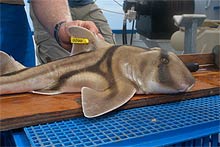|
Kate Rodda, Senior Research Scientist
11. What is the greatest distance any of your sharks travelled?
Port Jackson sharks do not move too far in SA. My study is fairly young in terms of movements, but up to 20 km over several months have been recorded so far.
12. What is the fastest shark you have tracked?
One Port Jackson shark was tracked at 0.5 m per second. It may not seem fast but try swimming after it to retrieve the tag!
13. Do sharks ever stop moving?
Yes some do. They are able to pump water (and therefore oxygen) through their gills through muscular action of their mouth. It is usually only the slower bottom dwelling species that can do this. Fast ocean going species cant get enough oxygen this way and have to keep swimming to get enough oxygen.
|

A tagged Port Jackson, ready for
release into the Spencer Gulf.
Image ©
Kate Rodda |
14. Do sharks really smell blood in the water? How do they find their food?
Yes. Sharks use a variety of senses to find their food. They use electrical, chemical, touch and visual cues. They are initially attracted by electrical and chemical cues and use them to pinpoint the area of food. When they are close enough, sight and touch becomes important.
15. What temperature ranges do your sharks live in?
The group that Port Jackson sharks are in are found around the world. My species is only found in Australia, from Western Australia to NSW, located in the cooler temperate waters (12-20oC).
16. Why do they cross into different temperature zones?
Port Jackson sharks in NSW migrate down the coast when they are about to lay their eggs in reefy habitat. They lay them when the water is about 14 oC and the young hatch a year later.
17. Do they migrate like whales?
Yes, but not on the same scale as whales. Some Port Jackson sharks migrate several hundred kilometers back to the same breeding sites each year.
18. Do sharks sleep?
All animals need to rest. Sharks don’t sleep like we do but they can go into deeper states of rest. They need to be ready at a moments notice just in case they are about to be preyed upon.
19. What can we learn from studying sharks?
Sharks can tell us a lot about how we function. Many of the physiological features we have (live birth, placentas) are first seen in sharks. They have the potential to help with cancer treatments, burns and a variety of other human medical problems. They are the top predator in the oceans and by understanding them we can begin to understand about the other animals that make up our biological systems.
|
